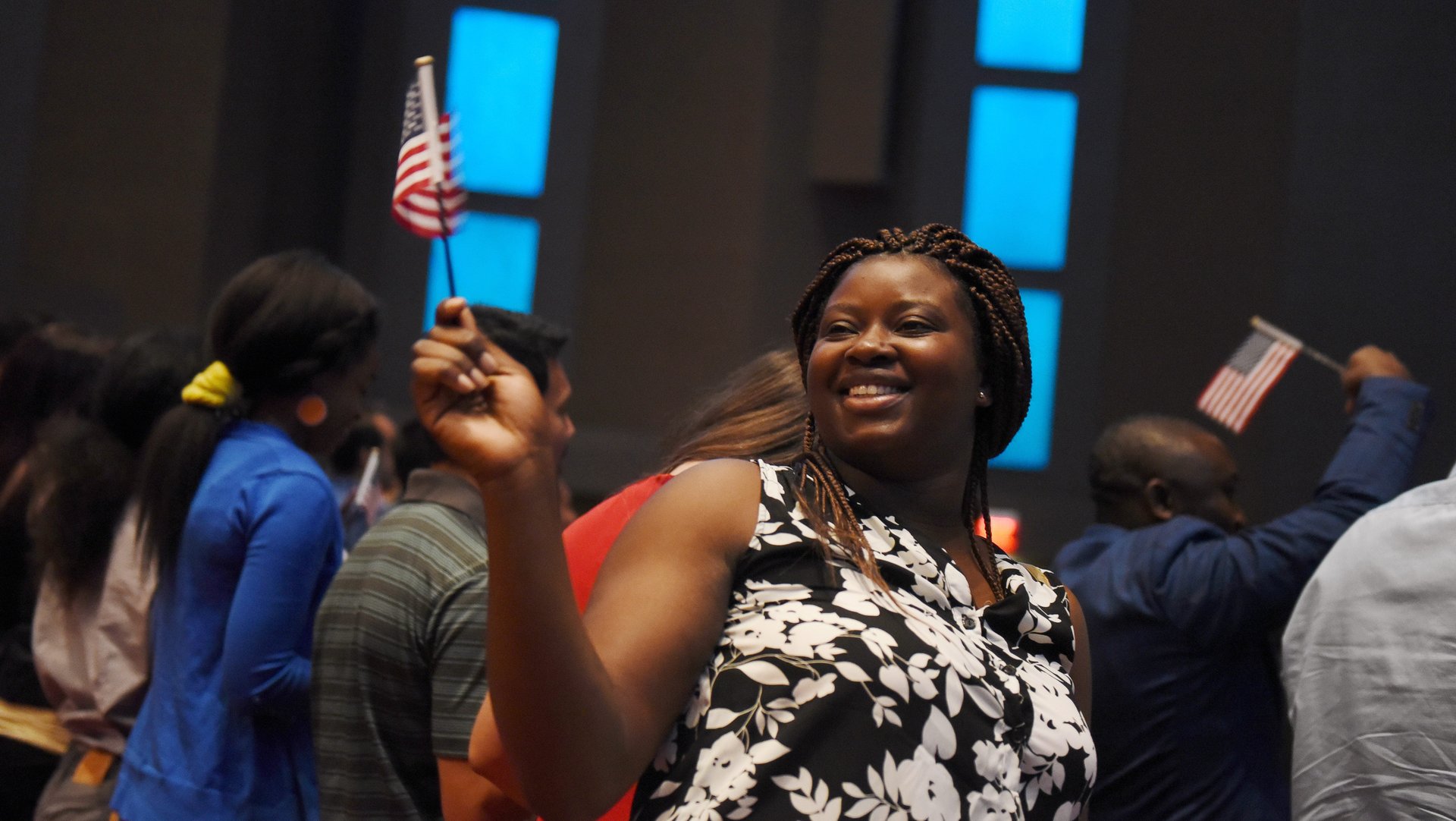The untapped political power of African and Caribbean immigrants in the US is set to take off
When it comes to the polls, black African and Caribbean immigrants in the United States are becoming a force to reckon with owing to a fast-growing population.


When it comes to the polls, black African and Caribbean immigrants in the United States are becoming a force to reckon with owing to a fast-growing population.
Between 2010 and 2018, the number of African and Caribbean immigrants in the U.S. rose by 30% to 4.3 million people from 3.3 million, according to a recent report from the bipartisan research group, New American Economy. Their growth has consequently led to more eligible Black immigrant voters. Although the more than 2.3 million eligible black immigrant voters make up the smallest share of the immigrant electorate included in this Pew Research Center analysis, their numbers have grown to 10% in 2018 from 7% in 2000. Overall in 2020, one in 10 eligible US voters will be a naturalized citizen.
This growth spells potential for more political influence, but it’s not clear Black immigrants are aware of their potential political power even as some find themselves in the crosshairs of two of the most fraught political topics of US politics in the Trump era: race and immigration.
“If you have come from a place where politicians are corrupt and don’t fulfill promises, you’re going to be apathetic to politics,” said Nneka Achapu, founder of AfriPAC, a non-partisan political group advocating for policies that empower the Black diaspora. “Black immigrants come with the mindset of: I have to stack as much money as I can.” This is understandable given that majority of these immigrants are fleeing impoverished countries and conditions. Political strategists for black immigrant groups are keeping an eye on battleground states including Ohio, Pennsylvania and Florida to potentially exercise electoral influence. Florida has the second highest population of eligible Black immigrant voters (112,911), almost four times the size of the state’s margin of victory in the 2016 presidential election. The concentration of Black immigrants in some states means that they may be able to exert electoral pressure in state or local elections.
Naturally, the Black immigrant electorate is not a monolith and within the population certain immigrant groups, such as Liberian-Americans and Somali-Americans, have been more politically active than others. Achapu’s criticism has been aimed at immigrants from West Africa, particularly those from Nigeria, the group with the largest number of Black immigrants from Sub-Saharan Africa.
That apathetic mindset, however, was more prevalent in three or four decades ago, said Washington D.C.-based political strategist, Sam Phatey. At the time, most immigrants, particularly those from the developing world, saw securing US citizenship as the “ultimate goal” and were focused on getting “great jobs” and pursuing the “American dream.” But now, with the recent spate of anti-immigration policies from the Trump administration, many of which threaten that goal, immigrants of all backgrounds have become motivated to political action—including those from African and Caribbean backgrounds.
According to Phatey, two events over the past decade spurred Black immigrants to further recognize their political power and increased their political awareness and participation: the elections of both Barack Obama and Donald Trump.
“Obama was a catalyst and you can see his pattern: Starting from the grassroots level to even losing elections, going on to become a state senator,” Phatey said.
President Trump recently imposed travel and immigration restrictions on residents and some visitors from Nigeria, Eritrea, Tanzania and Sudan and has reportedly made disparaging remarks about African countries with his now infamous, “s***hole countries” leaked comments.
“[Black immigrants] know how a presidency like Trump’s spiked racism and social injustice and they see how it is hard for them to access basic services even when they can pay for them so they want all of this to end and they are taking action by voting,” Phatey said. “They are increasingly becoming aware of their political power.” Voter turnout rates among eligible Black immigrants at presidential elections rose steadily from 2004 to 2012 and dipped by one percentage point in 2016. Nonetheless, at the 2016 presidential elections, the voter turnout rate of eligible Black immigrant voters (61%) was higher than that of their Hispanic (53%), Asian (52%) and White counterparts (56%).
For Phatey, more evidence of the rising political clout of Black immigrants can be seen in representatives like Ilhan Omar and Joe Neguse. Ilhan, in particular, was buoyed to victory in 2018 with help from Minnesota’s Somali-American community. Their wins and the Obama-Trump effect have inspired other Black immigrants to pursue public offices on the local, state and national level.
“The Black immigrant community has been making significant contributions to these campaigns; they have been organizing themselves within their churches and their local worship centers,” said Phatey. “More people are organizing, merging their groups to form bigger and more powerful groups because they understand the divide-and-conquer rule and they know it’s not going to work anymore.”
The emergence of advocacy groups such as African Communities Together, AfriPAC, Black Alliance for Just Immigration, Refugee Congress and even community-focused ones like the Cameroon American Council and the Haitian Bridge Alliance, is a testament to these organization efforts. “Trump has galvanized the community,” Achapu said.
But for groups like the Black Alliance for Just Immigration, it is crucial to see the political clout of Black immigrants within the context of the broader political power of all Black people in the U.S., particularly non-immigrant African Americans.
“It is important to build off of what [non-immigrant] African Americans built and fought for. And pay homage to the civil rights fight and the fight to vote,” said Abraham Paulos, BAJI’s Communication Director. A crucial way to expand on that power is “bridging the gap between [immigrant] African Americans and [nonimmigrant] African Americans.”
Sign up to the Quartz Africa Weekly Brief here for news and analysis on African business, tech and innovation in your inbox